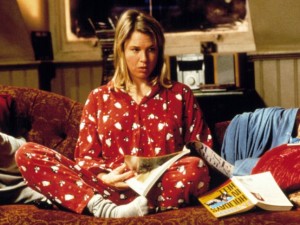 I have two good friends who are singletons and claim to actively prefer living alone. It’s hard for me to believe that this avowed preference is anything more than a sign that they’ve yet to meet Mister or Miss Right—which I’m well aware is nothing more than a complete failure of imagination on my part. Even though I’m a critic by trade, I do my best not to take it for granted that my own personal preferences are universal goods. My guess, however, is that most of us, myself included, are in the habit of assuming reflexively that our friends, deep down inside, share our feelings about most things, and I further suspect that no amount of evidence to the contrary is capable of extirpating this self-evidently wrongheaded notion.
I have two good friends who are singletons and claim to actively prefer living alone. It’s hard for me to believe that this avowed preference is anything more than a sign that they’ve yet to meet Mister or Miss Right—which I’m well aware is nothing more than a complete failure of imagination on my part. Even though I’m a critic by trade, I do my best not to take it for granted that my own personal preferences are universal goods. My guess, however, is that most of us, myself included, are in the habit of assuming reflexively that our friends, deep down inside, share our feelings about most things, and I further suspect that no amount of evidence to the contrary is capable of extirpating this self-evidently wrongheaded notion.
My own situation is, of course, entirely different. I spent a lengthy stretch as a singleton before Mrs. T and I met, learning in the process that I hate to live alone. To be sure, necessity forced me to figure out how to do so, to the point of learning how to take vacations by myself. By the end of that time, though, I was in no doubt of my inability to be truly happy without a compatible companion. When I found one, I blossomed.
 It happens that Mrs. T and I were forty-nine years old and fairly set in our ways when we got together. As a result, we took it for granted that we would need to build a certain amount of separation into our marriage, and life duly obliged us by demanding that we spend quite a bit of time apart. A decade later, the desire to “take time off” from one another has long since ebbed, and of late it has dried up completely. “We’ll appreciate each other even more when we finally get back together,” we say at the beginning of a temporary separation—but we both know better. All things being equal, we always prefer being together (if not necessarily in the same room) to being apart. For us, there is no longer any upside to separation, however brief: it is, as Dr. Johnson said of human life, a state in which much is to be endured, and little to be enjoyed.
It happens that Mrs. T and I were forty-nine years old and fairly set in our ways when we got together. As a result, we took it for granted that we would need to build a certain amount of separation into our marriage, and life duly obliged us by demanding that we spend quite a bit of time apart. A decade later, the desire to “take time off” from one another has long since ebbed, and of late it has dried up completely. “We’ll appreciate each other even more when we finally get back together,” we say at the beginning of a temporary separation—but we both know better. All things being equal, we always prefer being together (if not necessarily in the same room) to being apart. For us, there is no longer any upside to separation, however brief: it is, as Dr. Johnson said of human life, a state in which much is to be endured, and little to be enjoyed.
Not that our companionship doesn’t encompass its share of disagreements and difficulties, but they don’t matter, for we’ve learned the lesson that Stephen Sondheim taught so well in Company:
Somebody crowd me with love,
Somebody force me to care,
Somebody make me come through,
I’ll always be there
As frightened as you
To help us survive
Being alive.
 The press of work recently forced me to spend a night alone in New York while Mrs. T was at our place in rural Connecticut. I wrote all day, never once setting foot outside the apartment, and so was taken by surprise when I looked up from my laptop and saw that the sun had set.
The press of work recently forced me to spend a night alone in New York while Mrs. T was at our place in rural Connecticut. I wrote all day, never once setting foot outside the apartment, and so was taken by surprise when I looked up from my laptop and saw that the sun had set.
When I went downstairs to pick up the mail, I was no less surprised to notice that the lobby of our building was filled with the comforting odor of other people’s home cooking. Would it smell as good to me if I’d done the cooking? I asked myself, thinking of my mother’s lone failing as a parent, which is that she neglected to teach me how to cook for myself, much less anyone else. I did make a token effort to learn during my years as a singleton, assisted by three kindly women friends who took it upon themselves one night to show me how to prepare dinner for four. Needless to say, they did most of the work that evening, and having failed to follow up on the lesson, I found myself at a loss. So I ordered sushi—for one.
No sooner did my mother come to mind than I found myself missing her intensely. For years I telephoned her every night or two, usually calling from the back seat of my cab whenever I was en route to Broadway to see a show. While I didn’t get into the habit of calling her regularly until my father died, the thought had already crossed my mind that I would have loved to tell him what it felt like to share a stage with Nancy and Tina Sinatra in Beverly Hills. He died in 1998, too soon to know about most of my great adventures, the greatest of which was meeting Mrs. T.
Now I’ve gotten into the habit of calling her from the cab en route to Broadway whenever we’re apart. Alas, there was no show that night, so I ate my sushi, looked at the art on the walls, listened to Virgil Thomson’s “Capital, Capitals,” watched Kiss of Death on TV, and read myself to sleep with the second volume of Emlyn Williams’ autobiography. Such is the homely pattern into which my nights as a temporary singleton typically fit. Yes, I manage—but I’m able to do so mainly because I know that the need for self-management will come to an end sooner rather than later. May it ever be so.
* * *
From John Doyle’s 2006 Broadway revival of Company, Raul Esparza and the ensemble perform Stephen Sondheim’s “Being Alive”:


